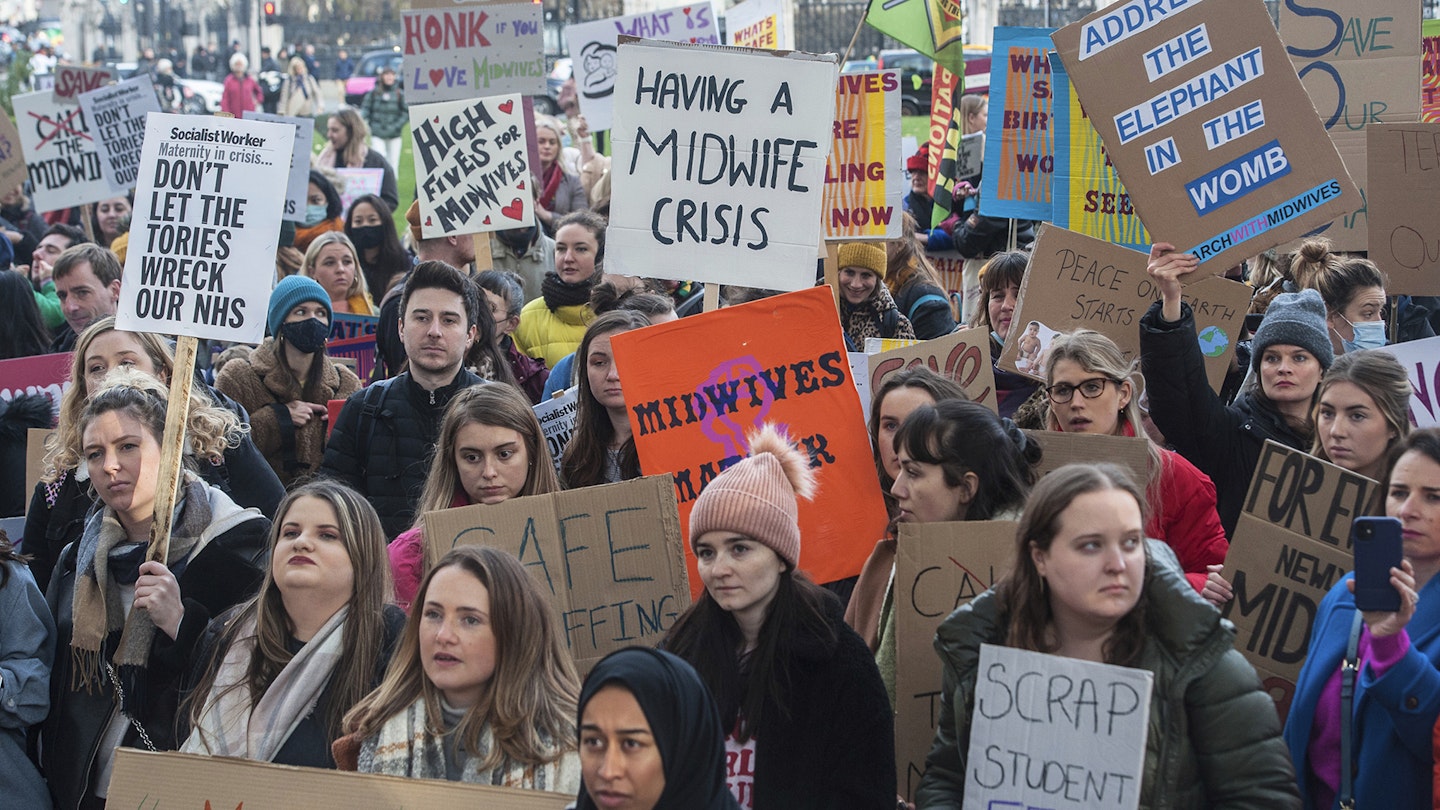In his first press conference of 2022, Boris Johnson offered a glimmer of hope that this year could see us return to normal life, as he assured us we could ‘ride out the Omicron wave without shutting down our country once again’. But while the country may ride it out, its overstretched maternity services could be another story. This month, some maternity units across England have been forced to close temporarily due to staff shortages, with the Royal College of Midwives (RCM) warning this means ‘women are not receiving a high standard of maternity care that they need and deserve’.
Dr Mary Ross-Davie, director for professional midwifery at the RCM, told Grazia, ‘Every day, midwives are going to work wanting to provide safe, high-quality care, and they are doing their level best to continue to deliver that care in the face of many challenges. But in October, RCM members told us in a survey they were so concerned about staffing levels preventing them from doing their job, they would consider leaving.’
While the pandemic has played its part, Dr Ross-Davie says alarm bells were sounding in maternity care long before that. ‘Sickness absences due to Covid-19 have further worsened the existing shortage, leaving those left behind to fill the gaps.’
‘I’m due to give birth in March and I’m worried,’ says Lucy*. ‘I’m scared there won’t be enough midwives on the day. When I go for scans, they’re doing everything they can to maintain service, but you can see they’re running on empty. I’m also worried about giving birth without my husband, because some hospitals are reintroducing restrictions to protect midwives, which I do understand. The midwives I’ve seen are doing everything they can, but this has been the worst time to be pregnant – from being told at the start to make our own decision about getting vaccinated to worries about getting Covid and now fear over care.’
‘I’ve been a midwife for seven years and I think about quitting every day,’ says one woman, who wishes to remain anonymous. ‘My family want me to because they can see how stressed I am. The only thing stopping me is the fact I love the job. When you can do it with proper staffing and support, there’s no job like it. But current conditions are awful. We’re always short-staffed; every shift I see colleagues in tears because they feel they’re not doing enough for the mothers in their care. The workload is insane, but we don’t have time to complain, and when we do, not much is done.’
In November, more than 12,000 midwives and their supporters held vigils across the country to raise awareness about the UK’s maternity services, in protests led by #MarchWithMidwives, a grassroots movement set up by maternity care workers, including doula Maddie McMahon.
‘The campaign was started by doulas,’ says Maddie. ‘Midwives are at the coalface of the current crisis. Heads down, at breaking point, they feel unable to speak out, often told they simply need to be more resilient by NHS bosses, despite impossible workloads. Doulas have a bird’s-eye view of maternity services, working across several hospitals. We see how disappointed or scared pregnant women feel by another cancelled scan, or being told they must labour alone, and we also see the unrelenting pressure midwives are under. Just before the marches, we read the RCM survey that found six in 10 midwives plan to leave the NHS in the next year, and a few of us got together and said we wouldn’t be surprised if the whole system falls apart. We set up a Facebook group, which now has over 22,000 members, and hit the streets.’
Maddie hears stories from midwives who go on shift and, despite NHS rules requiring 10 midwives to provide a service, they find just three or four. ‘They then burn themselves out making up the shortfall, suffering what we call “moral injury” for struggling to work in a safe way. Or managers close units, forcing labouring mothers to drive 50 miles to the next available hospital.’
She also thinks maternity services are overlooked because it’s seen as a specific part of healthcare. ‘It’s seen as “women’s business”, a niche subject where it’s convenient to cut corners. But maternity affects everybody.’ And she points out that stripping back services – for example, moving postnatal checks online, and a lack of continuity of care – can lead to domestic violence and coercive control being missed.
Finally, like Dr Ross-Davie, Maddie believes Covid was simply the straw that broke the camel’s already overloaded back. ‘I live by the seaside and recently there was a huge storm that exposed the skeleton of an old shipwreck on the beach. That’s what the pandemic has done to the UK’s maternity system. It’s blown everything away and exposed the wreck we’ve all been walking past every day for years. It’s not just on its knees, it is utterly broken. And we need to fix it.’
